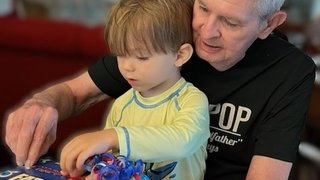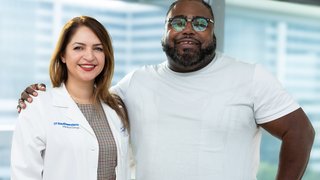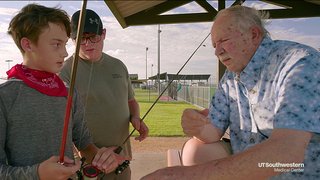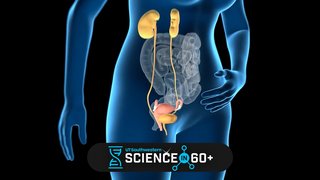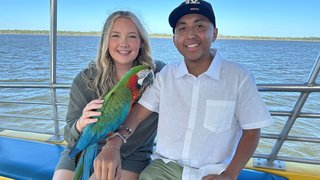Making transplants easier for veterans and their families
November 10, 2022

Men and women in the U.S. military put their lives on the line every day for their country. But when one of them has needed a lifesaving organ transplant, the process has not always been easy. Until recently, transplant surgeries were only available at a limited number of Veterans Administration medical facilities around the country.
For North Texas veterans, Houston or Nashville were the closest options.
Now, though, thanks to updated provisions in the MISSION Act, veterans are eligible to receive transplants much closer to home at qualifying hospitals such as UT Southwestern. Working closely with the Dallas VA, our transplant team is proud to be able to provide veterans and their families with improved and timely access to organ transplantation, honoring these brave men and women with the gift of life and the excellent care they deserve.
Here are two of their stories:
- Vivian Johnson, military mom and kidney recipient.
- Rick Nelson, Air Force veteran and liver recipient.
A Match Made in Heaven
Vivian Johnson is the proud matriarch of a military family. Her husband, James, completed five tours in war-torn regions of the Middle East, Macedonia, and Bosnia before retiring from the Army and working at the Dallas VA as a personnel security specialist.
Their two sons followed in his footsteps – one served eight years in the Army; the other is still serving as a medic in the Air Force. And their two daughters are schoolteachers.
Service and sacrifice are imprinted on the Johnson family DNA.
In 2021, when an infection caused Vivian’s kidney function to plummet and it became apparent she would need a second transplant, every eligible family member and their spouses said, “Sign me up!” to become a kidney donor.
Vivian, a former nurse, was diagnosed in 2002 with FSGS, focal segmental glomerulosclerosis, a rare disease that attacks filtering units inside the kidney. James was “the perfect match” to donate to her in 2004. Little did they know their oldest daughter, Kimberly, who was 14 at the time, was watching closely and vowed to herself: “If mom ever needs another kidney, I am going to be the one to give it to her.”
Just before Christmas 2021, she made good on that promise. “Mommy, I’m a match!” Kimberly, now a mother of three herself, shouted excitedly to Vivian over FaceTime.
A few months later, before dawn on March 10, mother and daughter put on their “Match Made in Heaven” T-shirts and drove to UT Southwestern’s Clements University Hospital for a life-changing surgery. Vivian admits she was initially reluctant to get a second transplant. Her motherly instincts kicked in when all her children wanted to donate. “I just didn’t want to put them through this.” But after the experience at UT Southwestern, Vivian said she would do it over 100 times.
“The level of care we received was amazing, from the transplant surgeons and doctors to the coordinators and nurses – even just getting blood work done. Everything was flawless,” she said. “And I’ve been around a lot of doctors in my life.”
Kimberly made a brief video to share on social media in hopes of raising awareness about the benefits of organ donation, particularly in the African American community. She and Vivian know there is fear out there, and some misconceptions, so they hope their story will inspire others.
“This is definitely a story of true sacrifice,” Vivian said. “When I think about what my husband did … and my children seeing that, it just embedded in them the importance of service, not just to their family but to their community, too. Being a part of a military family – and now the UT Southwestern family – is really a blessing.”
A True Lifesaver
Rick Nelson spent four years in the Air Force, specializing in satellite ops and reconnaissance. The experience built the foundation for his nearly 40-year career in the computer engineering industry. But that wasn’t the most valuable benefit of his military service, he said recently.
In 2022, he found himself in desperate need of a new liver, and through careful coordination between the Dallas VA and UT Southwestern’s transplant team, he got it just in time.
“I served in the Air Force for four years, and thank God I did,” he said. “We wouldn’t be talking right now if I hadn’t. It was a true lifesaver.”
In 2005, Rick was diagnosed with an autoimmune disease called primary sclerosing cholangitis (PSC), which causes the bile ducts in the liver to become inflamed and scarred. Over the years, Rick’s PSC led to a lot of collateral damage – an enlarged spleen, ulcerative colitis, an aneurysm, a hernia, and significant bone loss in his hip joints. He also had hearing problems, and in late 2021 doctors at the Dallas VA had to regularly remove fluid from his chest and abdomen. His liver was shutting down.
Rick had never been to a VA hospital until he moved to Sherman, Texas, about five years ago – he had always had employer health care benefits. And despite his many PSC-related problems, Rick’s MELD score was not high enough to qualify him for the transplant list. MELD (Model for End-stage Liver Disease) scores range from 6 to 40; the higher the number the more likely a patient is to receive a liver from a deceased donor.
He began exploring the possibility of having a living-donor liver transplant, a procedure in which part of the liver is removed from a healthy adult and transplanted into the patient. (The liver has an amazing capacity to regenerate within weeks.)
UT Southwestern is one of the medical centers in the area that offers the complex surgery. But on Jan. 31, 2022, Rick’s MELD score skyrocketed above 30, likely triggered by an infection. He went to the emergency room at UT Southwestern, where the transplant team knew the clock was ticking to find him a donor liver.
After about a week of close calls, a nurse came into Rick’s room at 11:05 p.m. on Feb. 8 to give him the good news: They had found a great match and he’d be getting a new liver at 7 the next morning.
“It really was a life-or-death thing,” Rick said. “My liver was black except for one little pink stripe. The doctor told me, realistically, I probably had 7-10 days to live.”
His recovery has been swift. Rick’s overall look and color changed in only two days. Even his hearing cleared up. Six days after surgery, he was able to go home.
The transplant team at UT Southwestern, and particularly Arjmand Mufti, M.D., Medical Director of Liver Transplantation at UTSW, was with him every step of the way, Rick said. In the hospital and on follow-up visits, Dr. Mufti had the answers to his many questions.
“I have a tendency to research,” Rick said with a wry smile. “They did a fantastic job of making me feel comfortable and confident about the entire transplant experience.
“The truth is,” he added, “because of the PSC I had probably been in decline for about 20 years, so I haven’t felt this good in as long as I can remember. Once I have my hips fixed, it’s back to the bucket list – scuba diving, camping, and adventure travel. That’s how much better I feel.”
To learn more about UT Southwestern's Transplant Program and services, please visit our website.



